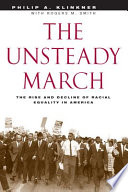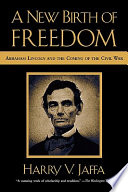 | Jon L. Wakelyn - History - 1999 - 408 pages
...on which Mr. Lincoln is elected, explicitly declares: "That the maintenance inviolate of the rights, and especially the right of each State, to order and...according to its own judgment exclusively, is essential to that balance of power on which the perfection and endurance of our political fabric depends." I have... | |
 | Philip A. Klinkner, Rogers M. Smith - Biography & Autobiography - 1999 - 446 pages
...1860 did not contradict Lincoln's views in regard to the territories, but it stressed its support for "the right of each state to order and control its...domestic institutions according to its own judgment exclusively."6 Furthermore, in response to opponents' charges that they favored "African amalgamation... | |
 | Lucas E. Morel - Biography & Autobiography - 2000 - 272 pages
...inclination to do so."49 This was the same course announced in the 1860 Republican platform, which read: That the maintenance inviolate of the rights of the...according to its own judgment exclusively, is essential to that balance of powers on which the perfection and endurance of our political fabric depends; and we... | |
 | Michael E. Latham - Political Science - 2000 - 308 pages
...of 186o directly addressed southern concerns, advocating "the maintenance inviolate of the rights of States, and especially the right of each state to order and control its own domestic institutions," while condemning any "lawless invasion" of a state or territory "as among the gravest of crimes." Republican... | |
 | Kermit L. Hall - Law - 2000 - 464 pages
...and Whigs, acknowledged the obligation to preserve "the rights of the States . . . inviolate . . . , and especially the right of each State to order and control its own domestic institutions . . . exclusively, 'rights' essential to that balance of power on which the perfection and endurance... | |
 | Harry V. Jaffa - Presidents - 2004 - 574 pages
...the fugitive slave clause of the Constitution resemble, but are not identical to, those for honoring the right of each state to order and control its own domestic institutions. In both instances it is the law of the Constitution, and fidelity to the Constitution is a sine qua... | |
 | Lowell Harrison - History - 2000 - 346 pages
...compensated emancipation. In his 1861 inaugural address Lincoln had stressed the Republican acceptance of the right of each state "to order and control its own domestic institutions," and he reaffirmed that pledge whenever possible. Yet there were doubters in Kentucky from the start... | |
 | Hubert Harrison - History - 2001 - 510 pages
...first inaugural, to support his contention, he quoted from the Republican party's platform: Resolved, That the maintenance inviolate of the rights of the...according to its own judgment exclusively, is essential to that balance of power on which the perfection and endurance of our political fabric depend, and we... | |
 | Jeffrey F. Meyer - Religion - 2001 - 382 pages
...the Union. He did not believe that as president he was constitutionally empowered to interfere with the "right of each State to order and control its...institutions according to its own judgment exclusively." But he did oppose any efforts to secede from the Union as equally unconstitutional. He urged caution... | |
 | Kermit L. Hall - History - 2001 - 806 pages
...and Whigs, acknowledged the obligation to preserve "the rights of the States . . . inviolate . . . , and especially the right of each State to order and control its own domestic institutions . . . exclusively, 'rights' essential to that balance of power on which the perfection and endurance... | |
| |